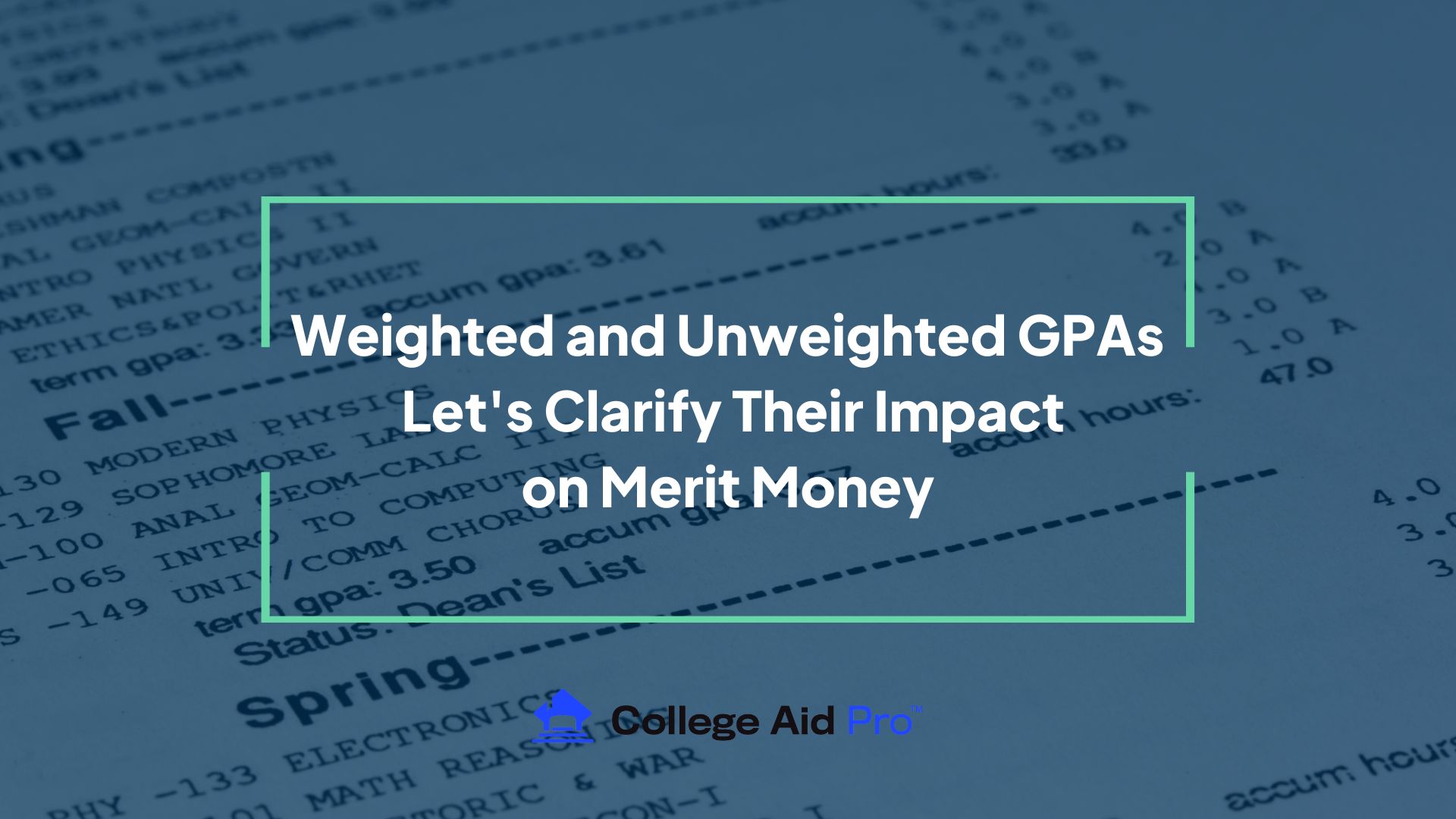Merit Scholarships: How do Colleges look at Weighted and Unweighted GPAs?
Merit scholarships are a great way to get school either fully or mostly covered, meaning no debt for the degree. But what kind of GPAs are colleges looking at when assessing merit scholarships? We have everything you need to know about weighted and unweighted GPAs, and how they affect merit scholarship awards below.
What is a merit scholarship and how do you get one?
First, let’s get down to the basics of what a merit scholarship is and how they’re awarded. Merit scholarships are scholarships the university awards based on “merit” or a specific combined GPA and SAT/ACT score. They usually cover many expenses and are given out as an incentive to draw top candidates to their school.
Keep in mind, typically smaller or “lesser-known” schools are willing to give out more in merit scholarships than premiere schools, because they want to bring top scholars to their university. If you have a merit scholar on your hands, it’s important to review all school options and potential awards before selecting which college to attend. Even if your student gets accepted into a top university, it may be more beneficial financially to go to a lesser-known campus.
You can try to sift through award offerings all on your own, or you can find a program that helps you compare your award letters all at once. A free MyCAP account gives you the power to compare and appeal award letters all in one place. With this, you’ll be able to make the best financial decision for your student’s future, and potentially appeal for more funds at their dream college if the financial aid package is less than what you need.
What is an unweighted GPA?
An unweighted GPA is the traditional look at a GPA, or at least the one most are familiar with. This is where all classes, regardless of difficulty, are given the same “point” equivalent for the correlating letter grade i.e. A = 4, B = 3, C = 2, and so on.
These figures are then totaled and averaged to give you your unweighted GPA. There are no special considerations for AP or college-level courses vs. traditional high school curriculum with an unweighted GPA.
What is a weighted GPA?
A weighted GPA gives more value or “weight” to certain courses, typically an AP, Honors, or college-level class. For most of your student’s classes throughout high school, they’ll stay with the unweighted or normal value. But if they have taken AP, Honors, or college-level courses and their school uses a weighted GPA system, higher point values will be given in those advanced classes.
The weighted GPA is still totaled up and averaged just like an unweighted GPA. This means your student can get an above 4.0 weighted GPA.
Example of Weighted vs. Unweighted GPA Letter Grade to Point Equivalents
| Grade | Unweighted Points (all AP & non-AP classes) | Weighted Points (AP classes) |
| A | 4 | 5 |
| B | 3 | 4 |
| C | 2 | 3 |
| D | 1 | 2 |
| F | 0 | 0 |
This means, if your child had all AP or advanced classes and received As in all of them, they would have a weighted GPA of 5.0. However, their unweighted GPA would be 4.0.
Why is there a difference between weighted and unweighted GPAs?
The idea behind a weighted GPA is that if your high school student can manage college-level or AP courses, they will succeed in a proper college setting. It’s the sentiment that these classes are more advanced and therefore hold more weight than a traditional high school level course. They are more rigorous, therefore, your student should be rewarded by their efforts, even if they didn’t make as high of a letter grade.
What type of GPA do college admissions look at?
College admissions typically look at your unweighted GPA. Sometimes they will use their own system to recalculate high school GPAs to keep admissions fair. Since not every school in the US uses a weighted system, they can’t look at 5.0 weighted GPA above a 4.0 unweighted GPA if those students took the same or similar curriculum load.
Even though most schools don’t factor in your high school calculate weighted GPA, college admissions departments do look at the type of classes your student took when assessing their fit. So if your student took advanced classes, they will look like a stronger candidate during the admissions process over someone else who took less rigorous classes with the same GPA.
How does a weighted or unweighted GPA affect merit scholarship awards?
Merit scholarships are awarded based on GPA and/or SAT/ACT scores. Typically, your student must meet a set of rigorous SAT/ACT scores plus have a solid GPA to back it up in order to qualify.
For merit scholarships, they can use either the weighted or unweighted GPA. As with all things related to college, it depends on the school and it’s important to research what each school does with GPA and/or test scores for merit scholarships. This past fall we published our first merit scholarship transparency report card on over 450 of the top US colleges and universities. Take a look at how the schools you are looking at scored and how much they share about their merit scholarships.
Final Thoughts
Merit scholarships are high reward and offer larger rewards than any other scholarships. They are highly coveted and are a huge asset to the universities that offer them. That also means they’re highly competitive and not all students actually receive them.
All this to say, set your expectations accordingly. Your student is probably very intelligent, but that doesn’t mean they will get a full ride. There are many other students with the same or similar skill set all across the globe likely trying to get into the same coveted university as your student.
We aren’t saying this to be discouraging and tell you there’s no hope. We are saying this because we believe there is hope for your student to graduate with as little debt as possible even if they aren’t awarded enough merit money to cover the full cost of college for four years. We encourage you to do the following:
- Complete the FAFSA and/or CSS profile – this gives you the best opportunity at free money for your student in grants based on financial need.
- Look into private scholarships – these can be great ways to get extra cash for tuition, books, room + board, etc. We especially encourage you to look at local scholarships from organizations within your community as you’re more likely to be awarded them due to less competition.
- If you can, start planning early – start a savings plan early for your child and encourage others, like grandparents, to contribute to the fund with you.
- Have your student consider other options besides Ivy League or other top schools – it’s hard to disappoint your student, but gently sharing that another school might be a better financial fit could mean a major savings for your student in the end.
- Appeal your award letter – write a letter of appeals if you feel your circumstances are deserving of or have changed to merit additional funds or scholarships.



